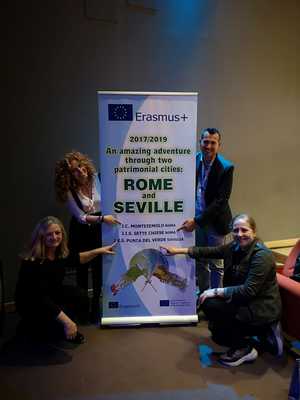
SOCIAL CONTEXT
The Spanish school is very heterogeneus with a great variety of educational programmes, some of them bilingual Spanish-English and in addition teaches secondary and vocational studies for young and adult learners. It also has students from different nationalities and socio-economic contexts, some of them at risk of social exclusion or living in disadvantaged environments. It also provides teaching to students with disabilities and learning difficulties.
Both Italian schools have students who belong to different cultures and economic circunstances and students with disabilities and learning problems. One of them is a primary and medium secondary school and the other a high secondary school or Liceo. Both prepare students to get language certifications and the liceo has a bilingual programme with Cambridge University.
AIMS OF THE PROJECT
The students of the three schools will...
- learn about the history and culture of the cities of Rome and Seville analysing and comparing them.
- use, develop and improve their competences in English and have contact with another foreign European language with the same origin as their own.
- improve their own education by learning cultural aspects about the other country and by meeting people from a different nationality to become more tolerant and respectful
- value the importance of visiting other places and share daily life with another family becoming more autonomous at earlier ages and improving their social abilities.
- get an interdisciplinary approach to help them discover new interesests which will help them decide their professional future
- Experience and practise innovative methodologies and learn to work in groups
- achieve a motivation for learning and develop their autonomy as learners (learn to learn)
- Gain exposure to and participate in another educational system.
- Improve their digital competences.
THE NUMBER AND PROFILE OF THE PARTICIPANTS
The participants more directly involved in the two years of duration of the project will be at least 72 students who will participate in the mobilities, although many more students will be involved in the activities developed in the three schools. Half the students will be 12-13- year-old (1st ESO and 2nd Secondaria Media) and the other half 16-18-year-old (1st. Bachillerato and 3rd secondaria superiore). All of them study languages like English, French and Spanish.
DESCRIPTION OF ACTIVITIES
The project consists of two phases, one per each year: The Romans for the first year and Renaissance and Barroque for the second. Inside each phase the activities are ordered in the following stages:
STAGE 1: Before the mobilities:
Group work through eTwinning platform by the three schools doing research work and uploading information.
The younger students will prepare theatre sketches
The older students will prepare questions for the cultural contests and will study the information uploaded by the other school.
STAGE 2: During the mobilities:
Communicative activities at the host school and the visitors will attend lessons
Cultural visits and trips in the cities and surrounds doing presentations in English
The students will elaborate a field diary or log book
The younger students will perform theatre sketches prepared by them.
The older students will participate in Cultural Contests.
STAGE 3: After the mobilities
The students will elaborate artistic works like drawings and scale models. They will be started during the mobilities.
They will elaborate audio guides, photo albums, recordings , videos etc..
Photo Contest for students and teachers.
METHODOLOGY USED
The methodology will be communicative and learner centred. We will use Project based learning (lesson plan) and gameification (contests), as well as glottodrama (performances). Self learning will be promoted to increase the "learning to learn" competence. English will be the vehicular language throughout the project but students will also contact Italian and Spanish, they will use and develop the four skills: speaking, listening, reading and writing, which will improve their linguistic competence. Group work will be used in some phases of the project, sometimes mixing students from both nationalities. There will be a frequent use of ICT tools during the project to help increase their digital competence. The cultural competence will be especially upgraded during this project.
RESULTS AND IMPACT
- The impact will reach to students, teachers, schools and community
- The results will be spread by schools websites, social networks, teachers' platforms, parents' associations, etc.
- Questionnaires will be used to analyse opinions.
- All students' competences will be developed.
- There is a dissemination plan to widen the impact.
POTENTIAL LONG TERM BENEFITS
- Future use of teaching materials developed and new methodologies.
- Use of audio-guides in cultural visits.
- Teachers' experience and professional improvement.
- New future projects